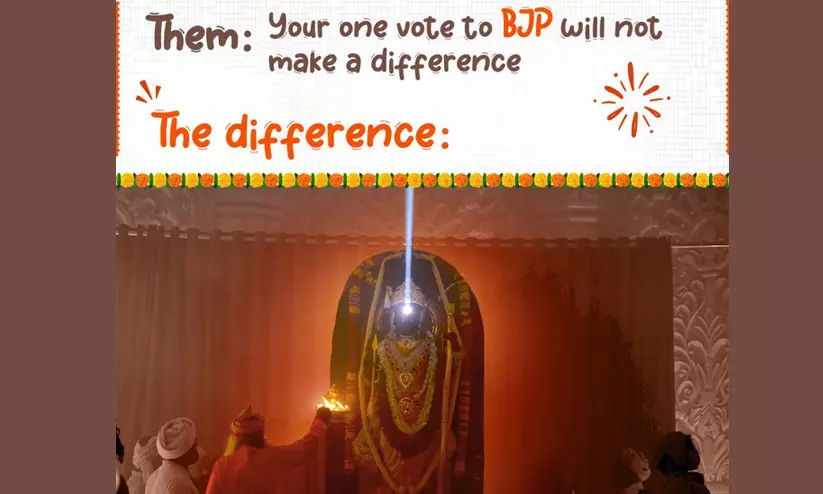
BJP’s use of religion, the MCC rule, and Election Commission’s silence
text_fieldsThe Election Commission has come under scrutiny after a BJP Twitter handle was found sharing a poster apparently seeking votes in the name of religion, in defiance of the model code of conduct, which expressly bars appeals 'to caste or communal feelings for securing votes.'
A day before the first phase of Lok Sabha elections in 2024, the BJP's official handle posted a tweet featuring an image of the idol of Lord Ram in Ayodhya, alongside a caption emphasizing 'the power of one vote' to the saffron party.
The tweet, which surfaced during the 48-hour silence period mandated by the Representation of the People Act, 1951, showcased the idol of Lord Ram adorned with a "Surya tilak" during a ceremony on Ram Navami.
The accompanying text implied that each vote for the BJP mattered, subtly linking it to religious sentiments, which are deemed as "corrupt practices" under Section 123(3) of the Act, explicitly prohibiting leveraging religious beliefs for electoral gains.
Even before the Lok Sabha elections were declared, the BJP and its right-wing allies have been found promoting religious fervour in public, with critics pointing to PM Narendra Modi endorsing Hindutva religious symbolism, particularly references to the Ram Temple in Ayodhya, allegedly with the intention to arouse religious sentiments. This has raised questions about the role of the Election Commission in enforcing fair electoral practices.
A report by The Wire has highlighted the BJP’s election campaign in a video showing Pepe the frog, a symbol associated with White supremacists in the US, in reference to Muslims, with pictures depicting right-wing 'milestones' in history, including the Babri Masjid demolition and construction of the Ram temple, and the frogs prostrating to symbolize Muslims’ defeat to the right wing.
Despite advisory notices from the Election Commission urging political parties to refrain from appeals based on caste, religion, or communal feelings, instances of such campaigns from the ruling political party have reportedly gone unchecked.
The advisory emphasized the importance of maintaining decorum and conducting issue-based debates during the election campaign. It explicitly stated that places of worship should not be used for election propaganda, and references ridiculing religious sentiments should be avoided.
In a letter dated March 15, 2019, the Election Commission had written to all national and state parties “to instruct and brief their leaders and campaigners to ensure that they observe the silence period on all forms of media as envisaged under Section 126 of the RP Act, 1951, and their leaders and cadres do not commit any act that may violate the spirit of Section 126.”
However, it's clear that the evolving landscape of social media and information technology has made it challenging to enforce the regulations effectively.






















